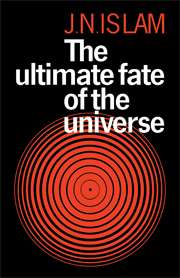Book contents
- Frontmatter
- Contents
- Preface
- Dedication
- Note on some conventions
- 1 Introduction
- 2 Our Galaxy
- 3 The large-scale structure of the universe
- 4 Elementary particles – a preliminary look
- 5 Is the universe open or closed?
- 6 Three ways for a star to die
- 7 Black holes and quasars
- 8 Galactic and supergalactic black holes
- 9 A black hole is not forever
- 10 Slow and subtle changes
- 11 Future of life and civilization
- 12 A collapsing universe
- 13 The steady state theory
- 14 The stability of the proton
- 15 Epilogue
- Glossary
- Selected bibliography
- Index
11 - Future of life and civilization
Published online by Cambridge University Press: 06 July 2010
- Frontmatter
- Contents
- Preface
- Dedication
- Note on some conventions
- 1 Introduction
- 2 Our Galaxy
- 3 The large-scale structure of the universe
- 4 Elementary particles – a preliminary look
- 5 Is the universe open or closed?
- 6 Three ways for a star to die
- 7 Black holes and quasars
- 8 Galactic and supergalactic black holes
- 9 A black hole is not forever
- 10 Slow and subtle changes
- 11 Future of life and civilization
- 12 A collapsing universe
- 13 The steady state theory
- 14 The stability of the proton
- 15 Epilogue
- Glossary
- Selected bibliography
- Index
Summary
I had a dream, which was not all a dream.
The bright sun was extinguished, and the stars
Did wander darkling in the eternal space,
Rayless, and pathless, and the icy Earth
Swung blind and blackening in the moonless air;
Darkness by Lord ByronIt is almost impossible to predict what forms living organisms will take (assuming they can survive) in such time scales as we have been discussing. In an attempt to survive various extremely cold conditions, life may take forms which would be considered weird by our standards. However, the possibility of survival of life and civilization in any form depends on the availability of a source of energy, and one can discuss the latter. In this chapter I shall examine the sources of energy available, if any, during each of the stages of the universe described in the previous chapters. At each of these stages there will be enormous technical ingenuity required for civilization to survive. I will assume in the following that such technical ingenuity will be forthcoming. Very often civilization or society will have to face acute social problems. It might very well be that civilization may not survive some such problems, for example, a completely destructive nuclear war. I shall assume in the following that civilization will be able to achieve the maturity and wisdom to avoid such social catastrophies.
There will be adequate energy available as long as the Sun radiates sufficiently, which will be a few billion years.
- Type
- Chapter
- Information
- The Ultimate Fate of the Universe , pp. 105 - 111Publisher: Cambridge University PressPrint publication year: 1983



